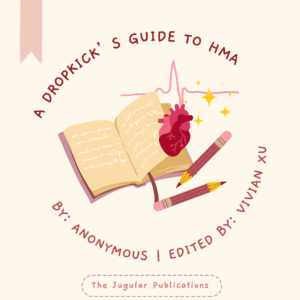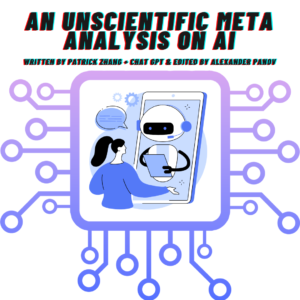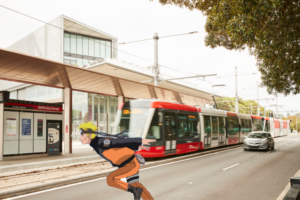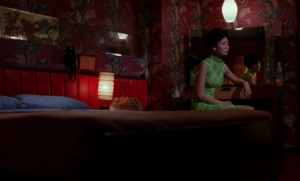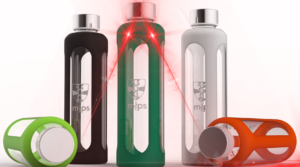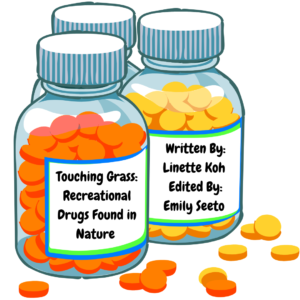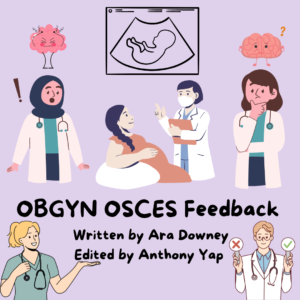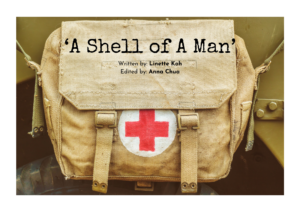
Written by KATERINA THEOCHAROUS
“Music is the medicine of the mind ” ~ John A. Logan
Moscow, USSR, 1952
The soles of his shoes, still a little wet from the snow, thudded quietly along the grey lino floor. It was a dull, muffled beat that they made, not unusual in its steadiness, its regularity – it was only a part, really, of the rest of the hospital’s noise, the soft hiss of air in and out of machines, the clink of syringes, the corners of posters rustling loose against the walls. A man in a space helmet. A young athlete on a track. The General Secretary, in his uniform, receiving a bouquet from a smiling child. The colours of the images were bold, bright, but – even they, Alexei thought, were fading a little now. They had been pinned up for so many months, so many years. They had been pinned up as if their rosy tones could fill the hospital with warmth when the heating failed, pinned up to stoke the smiles of the Party men who came, sometimes, with their shining, fixed buttons and their shining, fixed eyes. The Party men came to show their regard for their comrades – to tour the Main Ward, and shake the workers’ hands. Alexei had met them, once. They had smiled. They had thanked him for his service to the State. They had come to pace the floors of corridors polished in preparation for their visit, while, only two hundred metres down, the snow from workers’ shoes left grey grit on the floor and the children froze in their beds.
There, the Party men’s voices could not quite reach – echoing only through the occasional radio set, sat beside a patient’s bed. You needed connections, of course, to find a good radio in Moscow. You need connections to find anything at all. And there were few people with connections who would remain here instead of that centre specialised for their care, that centre that had softer sheets and whiter floors and where, Alexei thought, an operating mistake might leave you missing a limb instead of dead. Rounding a corner, the wheel of Alexei’s trolley skidded slightly – puncturing the silence with a squeal that tensed his legs, sent his head spinning over his shoulder. Why? He was committing no crime, he reminded himself. And there was no one with connections here, and – no Party men, either. Here, there were only the faintest, tensest whispers – stomachs growling, a baby crying and being shushed, the coughing behind doors. Here, there were only his footsteps. Dull, muffled. A beat.
When, at last, he reached the hospital basement, Alexei pulled the cloth cover from his trolley. The limbs, those small fragments of humanity – they would have to be dealt with first. Burnt away, in silence, before the patients had time to cry for their loss, before the bright-buttoned Party men might look upon their shapes and see them bleeding red. Once that was done Alexei could concentrate on the smaller things, the cans of waste from each department, from the cafeteria, from the radiology unit. Before the flames of the incinerator he held those x-ray prints up a moment, watched the fire flicker through their white-lit shapes. Skulls. Hands. Ribs. These images were warmer, he thought, here, beside the flame, than the people that they had been taken from. Beneath the silence he could hear fire crackling. A – rhythm. A whisper. The noise teased at his ears, sped up his heart. A rhythm. A whisper. A –
“You doing anything in particular with those, Durov?” a voice asked.
Alexei lurched to his feet, looking up at his superior – a round-faced, bulky man with dark eyes and dark, thick hair, and the sort of booming voice that could cut any rhythm in its tracks. “I – no, sir,” he said. He straightened, adjusting his uniform. “Just – looking to dispose of them, sir.”
His superior raised an eyebrow. Then – “See that you do, Durov,” he said. “In any case – your shift has ended. Go. We can’t have you hogging the fire all night.”
Alexei went, quickly, in his threadbare overcoat and with his head turned down – the general hospital waste piled into his arms, the x-rays sitting neatly on top. In the snow, in the cold, he dumped the lot onto the alleyway pile. This was the last task of his shift. He was committing no crime. He had just finished his shift and so now he could rest, a little, in the shadows of the alleyway – just for a few minutes before he went home. This was how it had been last week, too, when he had met the Party men, when he had been late out into the alleyway because of it. When, a few minutes delayed, he had seen things he normally would have missed. They had thanked him for his service, he reminded himself. He was committing no crime. He was committing no crime.
Alexei had almost given up when they finally arrived. The same two people as last week – he was sure of that. The boy wore the same too-short trousers, the girl the same ripped gloves. Just like last week – the boy keeping watch, the girl scampering up onto the pile. Rummaging through it – a rhythm in her hands. Alexei watched from the shadows. She did not have to rummage long. She found the x-rays he had brought, slipped them beneath her shirt and ran back towards the boy. They exchanged a few words. Left the alleyway like two lovers – holding hands. It was not a crime, Alexei reminded himself, to take from another’s waste. They had committed no crime. He had seen nothing of note. And – Heaven knew that he should just walk away. Heaven knew that there were some things he might later wish he’d never laid eyes on.
Alexei tilted his head back against the alley wall. He sighed – watching his breath cloud above him. In the absence of cigarettes the condensation bore an odd resemblance to a smoke. He still had a few Belomorkanals, he remembered, in his nightstand at the apartment. He suddenly found himself longing for the sputter of the lighter, the hiss of each drag. Heaven knew that he should just walk away and yet –
And yet –
The sounds echoing – outside the alleyway. Steady footsteps. The odd snatch of laughter, syncopating the beat. The x-rays rustling beneath the girl’s worn shirt, like white noise, like an insatiable itch, like a sputtering lighter on the last of its oil that, despite the silent Moscow snow, refused to go out.
He could still walk away, Alexei reminded himself. He had committed no crime. Heaven knew that he could still walk away and yet –
And yet Heaven also knew – Alexei thought – that it was not a crime to follow someone every once in a while.
~~~
For a while, Alexei wondered if they would notice him. It was cold, that day, and – the city was not as busy as it might have been. But then there was nobody, he told himself, to look over his shoulder at, or for them to look over their shoulders at either. They walked like lovers, with the easy gait of the well-practiced. As they approached their apartment block Alexei began to hang back. Concrete coffins, the people called them. These buildings had no elevators, no balconies. The concrete echoed. It would be difficult to follow somebody inside without being noticed. But from across the street Alexei could see through the shattered window, could see the door that the boy unlocked, followed the girl through, and –
Alexei was committing no crime, he reminded himself. He could hear his pulse, a throbbing, muffled beat amidst the snow. He was a man in a public building – a comrade paying his fellows a call. He walked, slow and steady, up the staircase. He sidestepped the broken glass on his left – the starving cat curled on his right.
And then – after a moment –
Alexei knocked upon their door.
~~~
Moments passed, like that – Alexei’s pulse counting them like a clock. It was the young man who finally answered, tall and pale and with a smooth, practiced steadiness in his voice. A beat – low, regular. “Comrade,” he said. “Can I help you?”
Alexei peered behind him, into the flat. It was dark, unassuming. The young woman was nowhere to be seen. “Comrade,” he replied. He swallowed – a chance to steady his own voice, to choose his own words. “I – my name is Alexei Durov. I am employed by the State Ministry of Health.”
He saw the flicker in the young man’s face. He saw the way his hand tightened upon the door handle. The young man said merely, “I see.”
There was a pause. “May I come in?” Alexei asked.
The young man licked his lips. “Of course, sir. I’ll just – ”
“Immediately, if you please,” Alexei said.
Silence.
Just – silence.
Alexei saw the way the boy’s eyes widened, slightly – the way his shoulders tensed, inching themselves up. He heard only the faintest quiver in the air as the boy drew back from the door. Alexei stepped forward and the boy stiffened, awkwardly – moved aside to let him in. Closed the door, its edge thudding dully against the concrete frame. “Should – should I – ?”
And yet there was still something musical, Alexei thought suddenly, about the boy’s wide eyes, his nervous movements – something quick and arrhythmic and whispering and strange, crackling like x-rays beneath an overcoat, like flames through the air between them. “Comrade,” he said suddenly. His pulse sped up. For a moment he felt dizzy, heard the blood roar through his neck. “I’m sorry. I – I should have been honest with you from the start. I am employed by the Ministry of Health, but – that is, I’m employed in a menial capacity. I collect their waste. I’ve come here out of curiosity alone because – well, you and the young lady – I’ve seen you taking the x-rays, and I thought – ”
Alexei was pushed backwards without warning – with a hand clasped over his mouth, with another on his shoulder, with a wall thudding heavily against the base of his skull.
~~~
It was some time before Alexei’s vision cleared, and even then a crackling buzz reverberated through his head. Even as he became aware of a tiny kitchen around him, a stove beneath his hands, a cabinet just behind his knees – even then there was the sound of the boy yelling (What are you doing? You idiot! Don’t you know they listen? Are you trying to get us killed?) and of the girl struggling to calm him (Nikolai, for God’s sake, the neighbours will hear you, shh, shh.) Even with his vision still blurry and his head still reeling there was the noise buzzing warmly in Alexei’s blood, a cacophony, a crackle, coughs and syringes and syncopated whispers all about to break free. “Tell me and I will not tell them,” he said. He saw the look they exchanged. The Party men had shaken his hand, had thanked him for his service. He had smiled, stiff and silent. Heaven knew that even then he was too far gone. “Tell me or I will tell.” He swallowed. “Please.”
He saw the question in the boy’s eyes – the way the girl nodded, slightly, and the boy breathed out. Knelt down – opening the cabinet doors. Alexei jerked out of the way and heard his feet skid, saw the girl watching him, her arms crossed. The boy – Nikolai – pulled something from the cabinet and set it on the counter, withdrew the tablecloth from around it with a flourish. A – a turntable, Alexei thought. It was called a turntable, some patients from the nomenklatura had them. The girl came forward, opened a ceiling cabinet and lifted down a pile of chipped plates. They clinked slightly. She separated the stack, pulled some plates from the middle – no. Not plates. Discs, to be sure, but – thinner, more ragged, with a pattern etched on them in white and black. It was – a skull, Alexei realised. It was an x-ray image of a skull.
And those were all the thoughts he had time for before the disc was set on the turntable – the needle put into place, the cacophony in his head muffled by the beating of his heart and the beating of a drum. That was all he had time for before the trumpet swung, and his breath caught in his throat, and in the gaps between the drumbeats there all of a sudden came sounds, clicking fingers and breathy snatches of brass and then dozens, hundreds, thousands of notes all tumbling over themselves like something finally breaking free and –
And suddenly, the snow seemed to be lifting.
Suddenly, the weight of the silence was gone.
~~~
Alexei did not know what the record was called. He had never heard this kind of music before. But – when it was finished, when there was nothing left but a low, static buzz, the girl came forward and lifted the needle. “We – we call them bone records,” she said. “We have a friend who can etch the songs on. The film is the only thing strong enough for the needle – the only thing we can get at all, what with the shortages, and – our friend pays us a little for bringing it. That’s all. I swear, that’s all.”
Alexei nodded – in acquiescence, in acknowledgement. He was watching the record, still in her hands. The record, warmed by friction, as if had been on fire – the record with the image of a human skull, an anonymous mind with invisible music etched deeply in. The boy and the girl were both watching him – standing so still, with the closeness of lovers. “You know that I won’t tell them,” he said.
The boy licked his lips. “And how can we trust – ?”
“It doesn’t matter,” the girl interrupted. The boy looked at her – fell silent. She was watching Alexei. Biting her lip. “If – if you want to tell – ” She stopped, swallowed. “We can’t stop you. But – you have to understand. It’s American music. If you tell – the things they’ll do to us. They’ll – ”
“You know that I won’t tell them,” he repeated. He stood up – off the counter. A strange kind of calm, in his chest. A strange kind of dizziness, like a syncopated rhythm, beating
in his head. “I won’t tell anyone.” Then – “Thank you,” he said.
Alexei did not miss the look that they exchanged, but his mind was elsewhere as he left the apartment block. On sound. On – explosions. There were some silent corridors, he thought, in the hospital, corridors where even the voices of the Party men couldn’t go. In those corridors, sometimes, with his trolley full of small bits of humanity, with children dying behind doors – just sometimes, Alexei would hum, the smallest snatches of a syncopated tune. He was one of the lucky ones. He was never caught. His heart, frightened, practiced, kept beating its rebellious rhythms beneath his footsteps. His hands kept leaving the x-rays atop the piles. Sometimes, he left other things between them, too. A few Belomorkanals. A good pair of gloves. Then – a radio, with a bent antenna, that someone with connections had just happened to forget in his room. He was committing no crime, Alexei reminded himself. In the corridor, when the Party men visited, he smiled and shook their hands. He had never committed any crime.
And he would look over his shoulder, sometimes, but – never, Alexei thought, would he look back. Never would he look back.

This story is based on true events, although artistic license has been taken. For more information: https://99percentinvisible.org/episode/bone-music/







